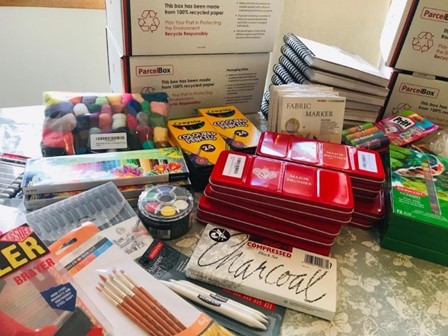Maternal Mental Health Scotland's Experts by Experience group used creative methods to give an artistic response to experiences of perinatal mental health services in Scotland.
What we did
In 2020, Maternal Mental Health Scotland was successful in receiving a grant from the Scottish Government Perinatal and Infant Mental Health fund. The bid sought to bring together the voices of lived experience from across Scotland, to explore experiences of perinatal mental illness and the service provision available.
The ‘Invisible Truths’ participatory arts project was launched and led by Elaine Connell from Blank Canvas Peer Support. The project recruited participants from within the existing Maternal Mental Health Scotland Experts by Experience Reference Group, a community of passionate individuals with lived experience of perinatal mental health issues. A cohort of twelve participants was formed, two of whom later chose to step down due to personal commitments. Participants came from across three health board areas in Scotland (NHS Grampian, NHS Greater Glasgow and Clyde, and NHS Lanarkshire). To help prepare for what the project would involve, two informal information sessions were held as part of the recruitment process. The group met online each month, providing a safe space for open and honest discussion about experiences.
Participants were provided with artistic materials and guidance on how to use the materials. They were asked to explore themes related to their experiences of perinatal mental health care, for example, language used by professionals, barriers to access, stigma and self-stigma, and issues of identity. Using a range of media, creative ideas were generated that could be developed into a visual response with a view to creating a body of work which would engage the public and policy makers, sparking conversations and shining a light on the state of perinatal mental health services in Scotland.

A body of work was developed using various media, including creative writing. The original aim was to display the work as a physical exhibition, which could potentially have toured the health boards around Scotland raising awareness of the need for improved perinatal services. However, due to the ongoing impact of the COVID pandemic this was not possible and it was decided to show as an online exhibition instead. The artistic pieces were photographed and displayed virtually on a website which has been viewed by practitioners designing perinatal and infant mental health services in Scotland, as well as used by NHS Education Scotland in their training. The exhibition received high acclaim from experts working in the field of perinatal mental health, and was viewed over 1,000 times in the first month.
The project has successfully shared the lived experiences of women who have been affected by perinatal mental illness in Scotland, highlighting the reality of perinatal mental health service provision across various health boards.
The exhibition will continue to provide a powerful narrative, educating healthcare professionals, trainees, third sector service providers and policy makers alike, on what it feels like as a new mum to struggle to gain access to support. It is hoped the work will help shape future services, and lead to provision which is easily accessible for mums, and their families, regardless of their postcode.
What worked well
A benefit of running the session on Zoom was that participants could join from different geographical areas of Scotland.
At the end of the project, participants were asked about their involvement. Feedback was hugely positive, with participants saying:
- they felt supported to use the art materials they had been provided with
- the monthly sessions were helpful from an emotional point of view
- peer support was particularly beneficial
Participants were inspired by the monthly sessions, equipping them with ideas for their creative work.
Presenting experiences artistically takes the experience one step back from the individual. Sharing your story can be a difficult experience, no matter how much you want to do it, and how much you want to use it to help other people. By creating a network, and appreciating the contribution of the artists, the project empowered us to be involved. We received arts materials and learned skills that we could go on to use in other aspects of our life, including without children (my water-colour palate is now well used by my daughter!). We weren’t just being asked to “stand up and tell our story”, we got something out of it too, via the support of the group, and the arts materials, and the self-esteem boost we could take from seeing our artwork and story displayed publicly.
Quote from participant
It allows you to showcase the moment a person has captured their own individual experience using a creative format. Each person has their own unique story to tell and capturing this in such a unique way means people can gain a deeper understanding of what perinatal mental illness is and how it affects people. It is also open to interpretation and I think can go a lot deeper than words alone can.
Quote from participant
Challenges
We would have liked to have reached more marginalised and racialised groups in our work in Maternal Mental Health Scotland in general. We have appointed a new participation officer, to focus on these groups, and listen to and share their voices as part of this process.
When asked if anything could have gone better, participants said ‘no’ except that it would have been beneficial to have met as a group had it not been for the COVID restrictions.
Contact
Elaine Connell, Blank Canvas Peer Support
Image credit: Maternal Mental Health Scotland / Black Canvas Peer Support
